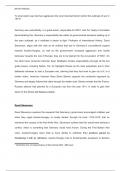Denise Timbulas
To what extent was German aggression the most important factor behind the outbreak of war in
1914?
Germany was undoubtedly, to a great extent, responsible for WW1, with the Treaty of Versailles
demonstrating this. Germany’s responsibility lies within its governmental decisions leading up to
the wars outbreak, as it exhibited a desire to fight. Professor of International History, David
Stevenson, aligns with this view as he outlines that due to Germany’s unconditional support
towards Austria-Hungary, as well as the governments increased aggression and hostile
behaviour towards the rest of Europe, they are to be blamed for the provocation of WW1. On
the other hand, American historian Sean McMeekin divides responsibility amongst all the five
great powers, including Serbia. Yet, he highlights Russia as the main perpetrator due to their
deliberate schemes to start a European war, claiming that they had most to gain out of it. In a
similar notion, American historian Harry Elmer Barnes supports the revisionist argument by
Germany and largely follows that claim through his written work. Barnes evokes that the Franco-
Russian alliance had planned for a European war from the year 1911, in order to gain their
desire of the Straits and Alsace-Lorraine.
David Stevenson
David Stevenson explores the viewpoint that Germany’s government encouraged a Balkan war
when they urged Austria-Hungary to invade Serbia1 through his book ‘1914-1918', that re-
examined the causes of the first World War. Stevenson outlines that this would have devised a
conflict, which is something that Germany would have known. During the First Balkan War
crisis, Austria-Hungary twice tried to force Serbia to withdraw from positions gained by
threatening it with an ultimatum. Austria-Hungary had to fundamentally acquiesce to Serbia’s
1
‘World War One: 10 Interpretations of Who Started WW1 - BBC News’.
, Denise Timbulas
territorial gains. This had not been the first time where Germany had supposedly ‘exhorted
Austria-Hungary into invading Serbia’. He states that German Emperor, Wilhelm II, told Austria-
Hungary to ‘march into Serbia, with Germanys' backing even if a war with Russia resulted’ 2,
demonstrating German aggression and want for war. In his book, he also argues that if they had
not had obscure insistence on its conditions over the assassinations of Archduke Franz
Ferdinand, it would not have led into a series of war declarations across Europe3.
According to Stevenson, ‘secretly the Austrians obtained a German promise of support for
drastic retaliation’4 assuring her support for Austria-Hungary, which led to their obscene
ultimatum on June 23rd. That secret assurance was referred as the ‘Blank cheque’5. Stevenson
states that the ultimatum demanded for the acceptance of their inquiry into the assassination,
and for Serbia to also supress all anti-Austrian propaganda 6. As you look closer to the
ultimatum's demands, it becomes clearer that Vienna wanted to make the demands as
unacceptable as they could, supporting Stevenson’s argument that its insistences were absurd 7.
He states in his book that ‘Austria-Hungary accepted a war without seriously discussing it, due
to their focus upon Balkan dilemmas’ whereas Germany was ‘much more conscious of what
they were doing’. Stevenson’s theory therefore builds on the claim that Germany was central to
the events that unfolded as they knew what they were enacting.
Overall, Stevenson’s point is that ‘without Germany’s want to provoke a conflict and
encouragement, it is unlikely that Austria-Hungary would have acted so drastically and risked a
2
Stevenson, 1914-1918, 44.
3
Stevenson, 44.
4
Stevenson, 37.
5
‘Cataclysm’.
6
Stevenson, 1914-1918, 37–38.
7
‘The Ultimatum | Der Erste Weltkrieg’.




